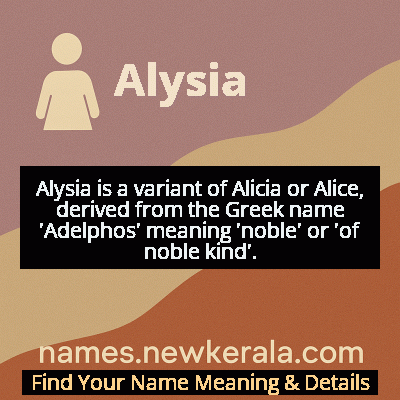Alysia Name Meaning & Details
Origin, Popularity, Numerology Analysis & Name Meaning of Alysia
Discover the origin, meaning, and cultural significance of the name ALYSIA. Delve into its historical roots and explore the lasting impact it has had on communities and traditions.
Name
Alysia
Gender
Female
Origin
Greek
Lucky Number
4
Meaning of the Name - Alysia
Alysia is a variant of Alicia or Alice, derived from the Greek name 'Adelphos' meaning 'noble' or 'of noble kind'.
Alysia - Complete Numerology Analysis
Your Numerology Number
Based on Pythagorean Numerology System
Ruling Planet
Uranus (Rahu)
Positive Nature
Strong sense of order, loyal, practical, and disciplined.
Negative Traits
Stubborn, overly serious, rigid, and prone to feeling restricted.
Lucky Colours
Blue, gray.
Lucky Days
Saturday.
Lucky Stones
Blue sapphire.
Harmony Numbers
1, 7, 8.
Best Suited Professions
Managers, engineers, accountants, organizers.
What People Like About You
Dependability, discipline, practicality.
Famous People Named Alysia
Alysia Reiner
Actress and Producer
Emmy-nominated performance in Orange Is the New Black and feminist film production
Alysia Montaño
Olympic Athlete
6-time US National Champion and groundbreaking advocate for athletic mothers
Alysia Rogers
Actress
Iconic role in Boyz n the Hood, contributing to African-American cinema history
Alysia Yeoh
Comic Book Character
Pioneering transgender representation in mainstream superhero comics
Name Variations & International Equivalents
Click on blue names to explore their detailed meanings. Gray names with will be available soon.
Cultural & Historical Significance
Extended Personality Analysis
Individuals named Alysia are often characterized by a unique blend of traditional values and contemporary thinking that makes them both grounded and innovative. They typically possess strong analytical abilities combined with emotional intelligence, allowing them to navigate complex social situations with remarkable finesse. Many Alysias demonstrate natural leadership qualities that emerge not through aggression but through consensus-building and genuine concern for others' wellbeing. Their noble name heritage often translates into a strong sense of personal ethics and responsibility, making them reliable friends and committed professionals. The name suggests someone who balances strength with sensitivity, capable of both decisive action and deep empathy. This combination frequently results in individuals who excel in careers requiring both intellectual rigor and interpersonal skills, such as education, healthcare, or creative fields. Their inherent grace under pressure and ability to maintain dignity in challenging circumstances often makes them natural role models in their communities.
Modern Usage & Popularity
In contemporary naming practices, Alysia occupies a distinctive niche as a name that feels both classic and fresh, appealing to parents seeking meaningful names with historical depth. While not among the most popular names currently, it maintains consistent usage across English-speaking countries, particularly in the United States, Canada, and Australia. The name's popularity saw significant growth during the 1970s-1990s, influenced by celebrity usage and its appearance in popular media. Current naming trends show Alysia being chosen by parents who appreciate its elegant sound and the positive qualities it represents, while the distinctive spelling helps it stand out from more common variations like Alicia. The name performs particularly well in multicultural settings, as its Greek origins and international variations make it accessible across different ethnic backgrounds. Social media and digital globalization have helped maintain the name's relevance, with many young Alysias building personal brands that reflect the name's connotations of intelligence, strength, and grace.
Symbolic & Spiritual Meanings
Symbolically, Alysia represents the eternal human quest for authenticity and moral excellence, embodying the philosophical ideal that true nobility emerges from character rather than circumstance. The name carries deep metaphorical significance as a bridge between the ancient world's philosophical ideals and contemporary values of personal integrity and social responsibility. In symbolic terms, Alysia suggests illumination and clarity - much like its linguistic relative 'aletheia' (truth) - representing the light of understanding that dispels ignorance and deception. The name also symbolizes growth and transformation, reflecting the journey from potential to actualization that defines human development. In psychological symbolism, Alysia represents the integration of masculine and feminine principles - combining strength with compassion, logic with intuition, and tradition with innovation. This balanced symbolism makes the name particularly powerful in representing the modern ideal of wholeness and authentic self-expression, where external achievements are matched by internal development and ethical consistency.

